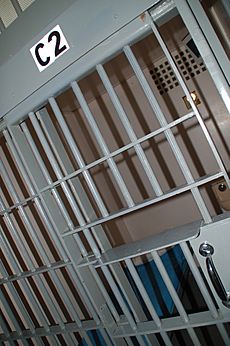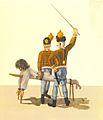Punishment facts for kids
Punishment is when something happens to a person or an animal that they don't like. This usually happens because they broke a rule or a law. There are many different kinds of punishment. For example, parents might give a "time out" to a child or take away their toys. For adults who break serious laws, the consequences can be very strict.
Punishment can be seen in different ways. Some people believe it helps society by stopping people from doing bad things. Others think it can be unfair or even cause more problems than it solves.
Contents
What is Punishment?
Punishment is basically a way to respond when rules are broken. It's meant to teach a lesson or prevent someone from doing the same thing again. It can also be a way to make sure people follow important rules that keep everyone safe.
Sometimes, punishment is about making up for harm caused. For example, if someone damages something, they might have to fix it or pay for it.
Why Do We Have Punishment?
People have used punishment for a long time. It helps keep order in groups, families, and countries. Here are some main reasons why societies use punishment:
Stopping Bad Behavior
One big reason for punishment is to stop people from doing things that hurt others or break laws. If someone knows they will be punished, they might think twice before doing something wrong. This is called deterrence.
Teaching Lessons
Punishment can also be a way to teach people what is right and wrong. When someone faces consequences for their actions, they can learn from their mistakes. This helps them make better choices in the future.
Keeping Society Safe
For very serious rule-breaking, punishment can help keep everyone safe. For example, if someone breaks a serious law, they might be kept away from others. This protects the community from harm.
Fairness and Justice
Many people believe that punishment is about fairness. If someone causes harm, there should be a consequence. This idea is part of what we call justice. It means making things right when something wrong has been done.
Different Kinds of Punishment
Punishment can take many forms, depending on the situation and the rules that were broken.
Everyday Punishments
In daily life, punishments are often mild. Parents might send a child to their room or take away screen time. Schools might give detention or suspend a student for breaking rules. These are usually meant to teach responsibility.
Legal Punishments
When people break laws, the government can give legal punishments. These are decided by courts and judges. Examples include paying a fine (money), doing community service, or going to jail. The type of punishment depends on how serious the law-breaking was.
Fines and Community Service
A fine is money someone has to pay as punishment. Community service means doing unpaid work to help the community. These are often used for less serious law-breaking.
Jail and Prison
For more serious law-breaking, people might be sent to jail or prison. This means they are kept away from society for a period of time. The goal is to protect others and to make sure the person faces consequences for their actions.
Views on Punishment
Not everyone agrees on the best way to use punishment.
Supporting Punishment
Some people believe that strong punishments are needed. They think it helps keep society safe and teaches people to follow rules. They might argue that without punishment, there would be more chaos.
Questioning Punishment
Other people believe that punishment can sometimes be too harsh or unfair. They might argue that focusing on helping people change their behavior is better than just punishing them. They might also say that some punishments don't really help people learn or become better.
It's a complex topic with many different ideas about what works best for individuals and for society.
Images for kids
-
Barbed wire is a feature of prisons.
-
Punishment of an offender in Hungary, 1793
-
Gothic pillory (early 16th century) in Schwäbisch Hall, Germany
See also
 In Spanish: Pena para niños
In Spanish: Pena para niños







